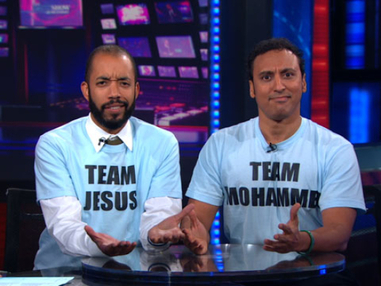
It’s hard to believe that we didn't see it coming: the rise of religion and religious conflict in the world. Just decades ago scholars and diplomats were dismissive of religion and its global influence. Case in point: Henry Kissinger’s 900-page tome on diplomacy, published in 1994, does not address religion.
Today views have changed. The eminent scholar of religion, Philip Jenkins, has said that “the twenty-first century will almost certainly be regarded by future historians as a century in which religion replaced ideology as the prime animating and destructive force in human affairs, guiding attitudes to political liberty and obligation, concepts of nationhood and, of course, conflicts and wars.”
Must we accept this as inevitable? Are religious people prone to be embroiled in conflict? We are witnessing armed insurrection by religious extremists, denominations dividing and congregations splitting, while seminary faculties protest and strike. Religion seems defined by conflict.
The pattern is familiar. Lines are drawn, people cease speaking to one another, friendships end. Litmus tests intrude: are you with me or against me? Zero-sum thinking triumphs: there must be winners and losers. So things go downhill.
Conflict in religious life is often traced to theological differences: liberal versus conservative, progressive versus orthodox. There is obvious truth in the distinctions, if only because many people cite them. But the source of religious conflict lies deeper.
What is really at stake is who we are called to be as religious people, and how we are going to get there. What is our relation to the world nearby and far away? What stance do we strike in regard to cultural and religious difference? How does our distinctive religious identity relate to the diverse identities around us?
This raises soul-searching questions about the malleability of religion. Some want religions to be set, static, fixed for all time, and they refuse to negotiate new ways of being. Others embrace change, but are unclear about its means and ends. Both draw lines in the sand and divide.
This is the heart of conflict: must we stay the same or should we change? If change, then how? There are no ready answers. But the way toward answers is to ask the questions together. This divide will not be bridged by supplying more information or data to one another. It is a relational gap. Coming together and daring to listen as well as speak, is the beginning of the answer. By God’s grace it will surface, if we seek it together.
Today views have changed. The eminent scholar of religion, Philip Jenkins, has said that “the twenty-first century will almost certainly be regarded by future historians as a century in which religion replaced ideology as the prime animating and destructive force in human affairs, guiding attitudes to political liberty and obligation, concepts of nationhood and, of course, conflicts and wars.”
Must we accept this as inevitable? Are religious people prone to be embroiled in conflict? We are witnessing armed insurrection by religious extremists, denominations dividing and congregations splitting, while seminary faculties protest and strike. Religion seems defined by conflict.
The pattern is familiar. Lines are drawn, people cease speaking to one another, friendships end. Litmus tests intrude: are you with me or against me? Zero-sum thinking triumphs: there must be winners and losers. So things go downhill.
Conflict in religious life is often traced to theological differences: liberal versus conservative, progressive versus orthodox. There is obvious truth in the distinctions, if only because many people cite them. But the source of religious conflict lies deeper.
What is really at stake is who we are called to be as religious people, and how we are going to get there. What is our relation to the world nearby and far away? What stance do we strike in regard to cultural and religious difference? How does our distinctive religious identity relate to the diverse identities around us?
This raises soul-searching questions about the malleability of religion. Some want religions to be set, static, fixed for all time, and they refuse to negotiate new ways of being. Others embrace change, but are unclear about its means and ends. Both draw lines in the sand and divide.
This is the heart of conflict: must we stay the same or should we change? If change, then how? There are no ready answers. But the way toward answers is to ask the questions together. This divide will not be bridged by supplying more information or data to one another. It is a relational gap. Coming together and daring to listen as well as speak, is the beginning of the answer. By God’s grace it will surface, if we seek it together.
 RSS Feed
RSS Feed
